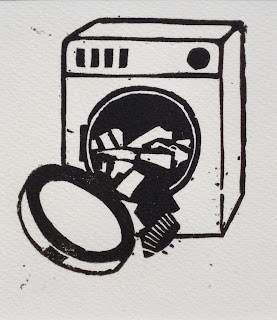What are Red Roses?
Red
Roses are minimalist accounts, vignettes, of real consultations in general practice.
Some are immediate and recent; some recount practice thirty years ago. First
published in 2014 as chapter endings in The Good GP Training Guide – RCGP
Publications, London, 2014; editors Matt Burkes and Alec Logan1. The original authors are eight UK GPs – Matt
Burkes, David Haslam, Dougal Jefferies, Helen Lester, Alec Logan, Faye McCleery, Hans Peiper and Deborah
Swinglehurst.
Red Roses are also illustrated, specially commissioned linocuts by Helen Wilson.
Red Roses are also illustrated, specially commissioned linocuts by Helen Wilson.
Vignettes
are anonymised and edited carefully to avoid risk to patient confidentiality.
The articles published in TGGPTG were externally peer reviewed by senior editors at RCGP Publications.
The articles published in TGGPTG were externally peer reviewed by senior editors at RCGP Publications.
An exercise in filling white space has grown. “A collection of lovely anecdotes dotted around the book practically illustrating what it is to be a GP by immersing you in thought or laughter!”2
Red
Roses are also an educational tool, to promote reflection on lessons learnt and
insights gained. At Lisbon and Liverpool 2014, Istanbul 2015, Rio de Janiero
2016.
But time to take the next step. The Red Roses Blog. Doctor-Patient stories on-line.
Why Red Roses?
A
story by the late great Helen Lester3 who died just a few months
before publication.
What is Red Roses, the Blog?
Red
Roses on-line, to allow access and comment, and submit new Red Roses.
Please view. Please reflect, share. Please comment on-line.
Then Submit Your Own.
Together
we build a repository of consultations, openly accessible. An archive and research resource.
Who can submit a Red Rose?
Anyone!
GPs and GPs in training, medical students, other doctors and health care
professionals. And patients!
How can readers submit a Red Rose of their own? Or comment?
Follow
instructions on our Submit button.
You will be asked to register and supply an email address and mobile
number. Other contact details are
encouraged but optional. You will
be required to declare that all descriptions of consultations are anonymised. Worth repeating – ANONYMISED.
For all new stories CONSENT TO PUBLICATION should be obtained formally from patients or responsible others. Our Consent Form is a click away. Please use it whenever possible.
All submissions and comments will be moderated pre-posting. We reserve the right to reject on whim, though will always try to supply constructive and graceful feedback.
Formats - please submit as text.
Future formats – as audio and video files, guidance coming soon.
Red Roses – The Mystery of General Practice. 4
Alec
Logan
General Practitioner
General Practitioner
Wishaw,
Lanarkshire, Scotland.
+44
7515 340446
October
2015


